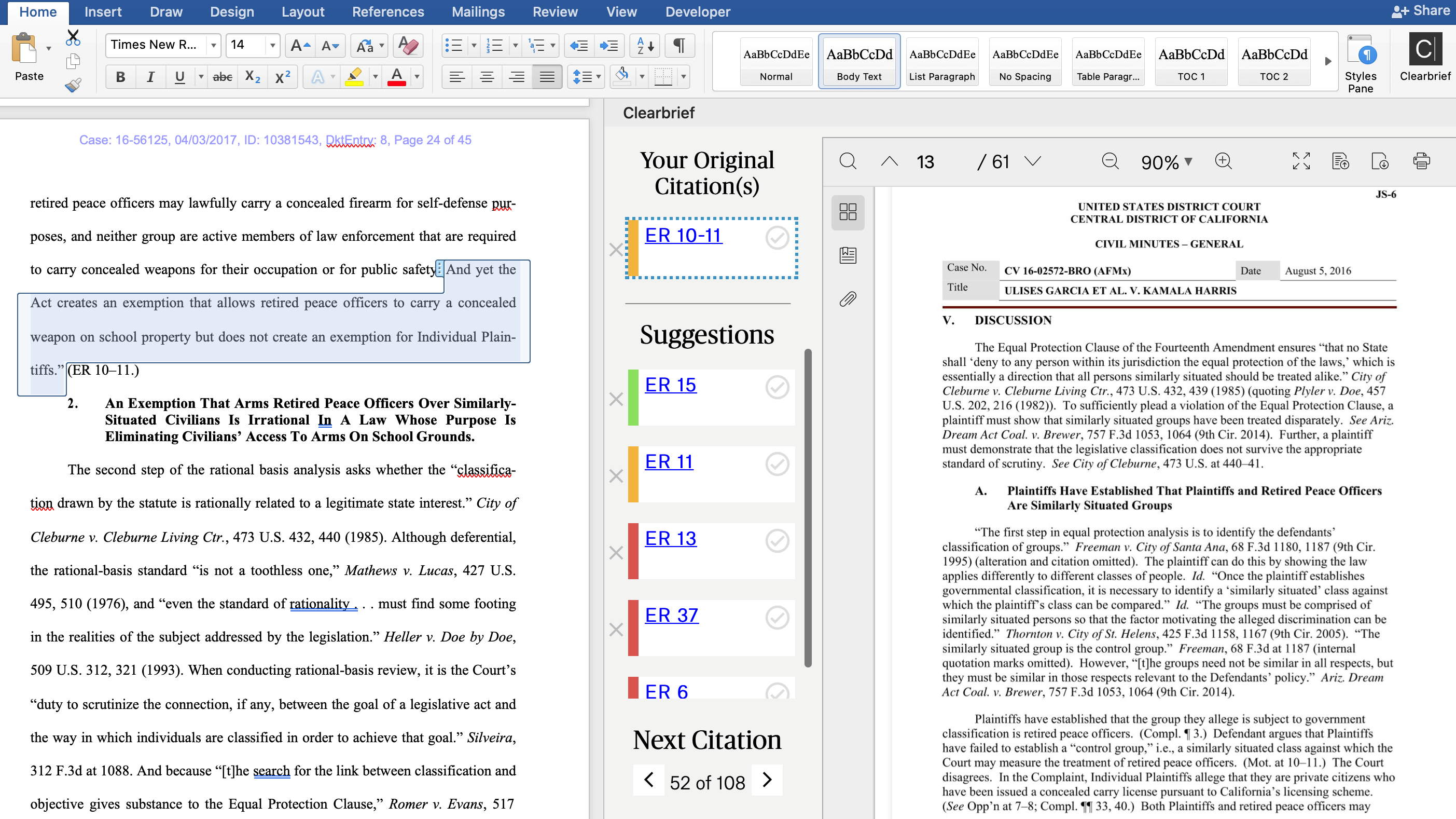If I were to tell you that Mark Britton, the founder and former CEO of Avvo; Bryan Garner, legal writing expert and editor of Black’s Law Dictionary; and Bill Neukom, longtime Microsoft general counsel, were all seed investors in a new legal technology product designed to strengthen your legal writing, would I have your attention?
In fact, they are just three of several legal-industry notables who have invested $1.2 million in seed capital in a company launching today, Clearbrief, that does something unlike any other legal technology product I have seen.
Clearbrief’s algorithm analyzes briefs and other legal documents to identify how well the writer’s sentence is supported by the cited source. It works with citations both to the record of the case, such as evidence and discovery materials, and to caselaw.
In addition, Clearbrief:
- Automatically fixes the formatting of all your citations and generates a table of authorities.
- Creates hyperlinks to the source document for each citation, including both record and case citations, and publishes the final brief online, where the judge and other parties can view the brief (via a secure link) directly alongside the cited documents and cases.
Clearbrief’s Seattle-based founder, Jacqueline Schafer, a former litigator, says the product can be used by a lawyer to review the strength of the lawyer’s own brief or to evaluate a brief received from an opponent. It could also be used to create a deposition outline, with links to all the pertinent exhibits.
Clearbrief works as an add-in within Microsoft Word, identifying each citation within your brief, aligning it with the cited document or case, and using color codes to flag the degree to which the cited material supports the statement that cites it.
It will also alert you if direct quotes from a case are inaccurate.
Schafer told me that lawyers who beta-tested the product, particularly lawyers in smaller firms, said that it gave them the comfort of feeling as if they had another lawyer helping them and a second set of eyes reviewing their work.
Judges who beta-tested the product liked the convenience of reading a brief with every citation — whether to the record or to a case — immediately at hand.
(A recent New York commercial court rule requires briefs to include hyperlinks.)
Schafer said she founded Clearbrief to address the stresses of writing and filing briefs that she encountered in her own litigation work. Her career started as a litigation associate at the New York law firm of Paul, Weiss, Rifkind, Wharton, & Garrison. She later served as an assistant attorney general in both Washington and Alaska, where she specialized in appellate practice and complex litigation.
She was particularly inspired by a pro bono asylum case she handled last year in Seattle. She knew that if she lost, her client and her client’s toddler would be deported and face possible death. The judge had not seemed favorable to her case, but there came a moment in the hearing when she was able to point to an argument in her brief and to the evidence that supported it, and he seemed visibly to come around to her position.
“I thought, ‘If you can show the judge the evidence that really tells your client’s story, that’s how you win,'” she told me.
She had also been studying AI technology for a paper she published last year in the Journal of Law, Technology & Policy on how AI innovation can be harnessed to help improve child welfare systems. Those experiences combined to give her the idea for Clearbrief.
“Clearbrief is a revolution for lawyers trying to win cases,” Mark Britton, the Avvo founder, said in a statement provided by the company. “This is a tireless 24-hour angel on your shoulder telling you whether you or your competitor messed up.”
While Clearbrief’s current focus is on the legal industry, the company says the platform is built with all professional writing in mind.
“Knowledge workers from insurance professionals to compliance managers need to provide evidence of their decisions,” Schafer said. “Clearbrief helps them locate and link to the documents supporting their conclusions, bringing transparency to organizational decision making,”
As of when I spoke to Schafer, she had not finalized pricing for the product. However, she said that it would be priced to be affordable for smaller firms. She expected to offer both subscription and a-la-carte options. A free trial will also be available.
While there are other brief-analysis products on the market, their focus is on finding key cases that the brief omitted or overlooked.
Clearbrief is the first product on the market that uses AI to evaluate the strength of each cited sentence in a brief. Although I have not yet tested it, it should be of interest to both litigators and appellate lawyers.
 Robert Ambrogi Blog
Robert Ambrogi Blog
